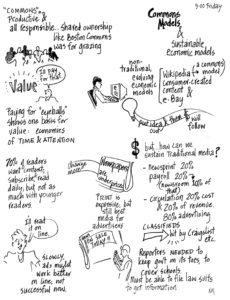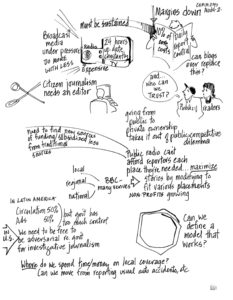Exploring economic models capable of sustaining and growing relevant journalism?
Convened by:
Lew Friedland Friday 9:30am
Notes:
Sarah Stuteville
Participants
Karen Toering
Jean Min
Ken Berents
Jan Schaffer
Lisa Cohen
Jonathon Lawson
Jarah Euston
Sarah Stuteville
Stacy Lynch
Sue Ellen Christian
Bill Krasean
Lew Friedland
Melinda Wittstock
Cindy Zehnder
Stephen Silha
Peggy Holman
Discussion 
Jan-
Jimmy Wales of Wikipedia commented he’s organized as a non-profit but now has revenues, though it’s all citizen content. Someone like him Entered the arena with no aspirations for an economic model, but one has emerged.
Lisa-
Maybe we should take a vote and see if people want to keep these two topics together?
Melinda-
Commons models are a subset of larger economic issue.
If you have an idea do you throw it on the wall and see if it sticks, or figure out the economic stuff first?
Linda-
What eco models are people familiar with?
Jean-
What is the real value of journalism? What are people willing to pay for? How do we figure that out? How do you put a price on this stuff?
Ken-
Psychic income
Jean-
Isn’t journalism rewarding enough? Or is it? What about fame?
Lew-
There is the economy of time and attention that readers/citizens can invest in your media. They give you time and attention which is something.
(Someone asks how Jean how OhmyNews supports itself)
Jean-
OhmyNews is 40% ad supported, 20% wire service type sales
 Stacy-
Stacy-
I spent a lot of time on profit and loss statements, on all this stuff. I can do the nitty gritty of this stuff. I think that finding a sustainable model for commons sites is an easier question than how we can do that for more traditional journalism. Commons models are so much less expensive. The single biggest cost for papers is newsprint (20%), than payroll(20%) (and 20% of that payroll is for the newsroom). The cost of subscriptions only pays for the print paper, we spend 20% selling it. There’s a lot of mechanics that goes with it.
80% is advertising. Within that a lot is classifieds. This is why the commons models are killing old papers. They can’t charge for listings anymore. How can we think of cheap less expensive ways to do the basic nitty ritty fact finding that every community needs?
You need 30 reporters on local politics. Citizen journalists can’t be counted on to do the less glamorous stuff like school districts, and local politics–the hard, time intensive stuff.
Ken-
Citizen journalists may not have the same access, lawsuits, ability to make requests for information. Citizen journalists can’t do that.
Jarah-
News orgs should wean their readers off of print
Ken-
This is a generational issue. Newspapers should be more expensive.
Stacy-
If we could just get rid of print, it would be easier. But the number one hurdle is that print is a more effective ad medium. Ad inserts are big. It is not as attractive on web.
Somebody-
Advertisers can direct mail.
Stacy—too expensive
Melinda—What drives circulation? How much does it have to do with journalistic content and quality? How much can journalists do to increase circulations of their papers?
Stacy—In the research we do about our readers 70% want good content. The people that really make this work are the subscribers.
Lew—Young people don’t read papers anymore, they read on-line. They may have the habit of reading a paper but just don’t want it in print. I think this will continue to happen– exponentially.
(Stacy)—Advertisers don’t get results with ads on the web because they just don’t work, people have learned how to ignore them
(Lew)—Part of the heart of this discussion is the cost of the daily report (20% for payroll 20% of that which goes to the newsroom). For those that care about journalism, the daily report is the heart of what makes journalism work. Sustaining that report economically is so important. If we lose that daily report the commons models can’t fill in the need.
(Somebody)–Can they?
(Lew)–For me the argument about economic sustainability is essentially about economically sustaining the daily report.
Commons models alone (I’m building one in Madison) cannot sustain the daily report. They will never pay for the level of professionalism that we have come to expect.
(Linda)—What about broadcast the new requirements to have this stuff on 24 hrs a day? The owners expect huge profit margins from us. What we see is that the quality has decreased and we’re using fewer people with less experience. Now you have to cover on LMA plus your regular station. You’re covering for too many entities at once. We need full time experienced journalists that are trained.
(Ken– you need an editor, citizen journalists don’t have that.
(Melinda)—one of the reasons public trust has eroding in part is because nobody knows who to trust because there are so many sources and so much information out there. Truth has gotten lost in that. The more we get cut back economically the more we have to count on Citizen Journalists. It’s a flowering of democracy to a point. But how good is it?
(Ken)–I have a solution, I follow these companies closely. The margins are going down and will get worse. These companies should go private. When you are a public company you have to compete with everyone.
(Jonathan)—What is the big picture? What is the role of media in our society? How does it help make our civic society work? Having a business model where the primary driving of the news organization is to maximize shareholder value may be able to coexist with good journalism, but it may not, and actually it probably won’t.
(Jean)—What about BBC?
(Everyone Talking)—Different culture! Different eco model!
(Melinda)—BBC is a non-profit, if you buy T.V. that money goes to a common fund and some gets directed to them. Capitol New Connection has found a way to get around this. Public radio would all have correspondents on Capitol Hill if they could afford it. CNC works by being hard nosed and productive, its reporters think about how they can maximize a story. It is affordable to public radio, they get their own correspond on Capitol Hill. It is an economy of scale. Reporters are paid between 45-55 thousand a year. As we grow their pay grows.
Non-profit news. This is a trend.
(Ken)—BBC tax model v. revenue model
(Melinda)—Everyone in public radio is trying to diversify revenue models.
(Karen)—The difference between non-profit and revenue is the difference between re-investment in the company vs. divvying it out to shareholders.
(Bill)—Has anybody looked at bottom line between public and private models?
(Cindy)—One thing to be careful about is trying to define “A Model” that works. One of the good things coming out of all of this is finding a number of models that work. There are many ways to get at all of this. Listening to the different possible models may help find something new. Maybe there isn’t one new model that we can find that will offer us the security we want. Maybe we should bundle models.
(Jonathan)—Multiplicity of models. Public media has a pressure to diversify fund sources. This is an opportunity to think about moving the other way. We should increase and celebrate public subsidies for media. Every broadcast company is hugely subsidized. Postage used to be subsidized. Why can’t news be so too (print)?
(Stacy)—I want to counter argue that. In Latin America they don’t have the advertising base. In many ways they all started off in highly subsidized situation. But they are highly controlled by the government. Their number one advertiser is the government. and if they pull their ad because they don’t like what is being printed they can destroy papers.
(Cindy)—I am government. subsidized. 80% of our operational funds come from state funds. We are also governed by an independent board of directors. I am acutely aware that what we do is not the kind of investigative journalism that would be too challenging to local government. You would not see us suing local legislature for information. We want to be wholesaler and retailer for other organizationss (getting out good info).
(Linda)—The critical thing to me is that there are many ways we can get our national and international news. We can’t outsource local though. As I watch and read our news, it seems to me we have gotten off track, as far as content. It’s like a crow looking at the shiniest thing and following it around. Is there a desire for a new thoughtful newscast? The market share is decreasing and all of the stations are going for a tiny piece of the pie.
(Jan)—You build your model on trust in the community. How do you leverage your trust in the community with other things that are of value. (target info, target ads)
(Ken)—target ads that’s were everyone is going.
(Jarah)—Wouldn’t it be great if your news source targeted ads to you as well?
(Jan)—Can you monetize an affinity group (the way blogs are affinity groups)
(Lew)—There is no way that you can monetize trust around something like the local school board. No one will pay me to cover the local school board. Here’s the problem, what broadcasters are doing, they used to have State Capitol correspondents now they’ve dropped them. Now papers are dropping them so they can rely on state spans, but everyone here is talking about how state spans are limited in what they cover (see Cindy’s comment from earlier).
(Lew)—small local papers are being set up to cover their communities. That’s what is happening.
(Stacy)—Advertisers aren’t the only problem here, there are many ways that advertiser can continue to be the primary funders. Advertising is not the root of the direction journalism is going.
(Lisa)—Maybe we can set something up so that advertisers understand or see how supporting high quality reporting is in their interest.
(Cindy)—People need and want to info, (even if trust is low). I want to throw out another model, KEXP, Paul Allen supported radio station. They want to create a tribe around the music experience that they show and create. The music is just stream, there is concerts and all kinds of things they do. They are building an affinity group around the music experience.
(Lew)—translate that to journalism
(Cindy)—people that are tied to certain concept journalism might be willing to pay for it. I want to organize people so that if they want to look for quality reporting. Starbucks model, people that pull together around the Starbucks experience, music, etc.
(Jarah)—Starbucks hasn’t been that successful with that
(Stacy)—People would have to pay like $600 a year to subscribe to a good paper is we get to the point where readers pay for all this themselves.
(Melinda)—Local coverage with NPR. Morning edition audience nationally is huge. And it’s a huge audience that advertisers want to reach.
(Lew)—There is only a very small niche of people that want NPR. What about wi-fi? I’ in S.C. and it’s a wi-fi as soon as you turn your computer on the first thing you see is the website of the local paper. Google announced that they are giving out wi-fi free. Basic level will be free and then you pay up for the other levels (like cable). What about Times Select? They only restrict 2% of their content. (Columnists Friedman) and archives, but people will pay for that stuff and you can increase revenue. Broadcast could do this too.
(Cindy)—The distinction between all of these mediums is beginning to go away. Think about convergence (not just print, broadcast, radio, etc)
Point of clarification on the Goodgle Wi-Fi deal
(Lew) the way this works. A company just signed up to put wi-fi all up
Supporting media without advertising?
(Karen)—We need a low barrier for participation in this information. I am concerned with levels and qualities of information for the haves and the have nots. I really can’t see this
